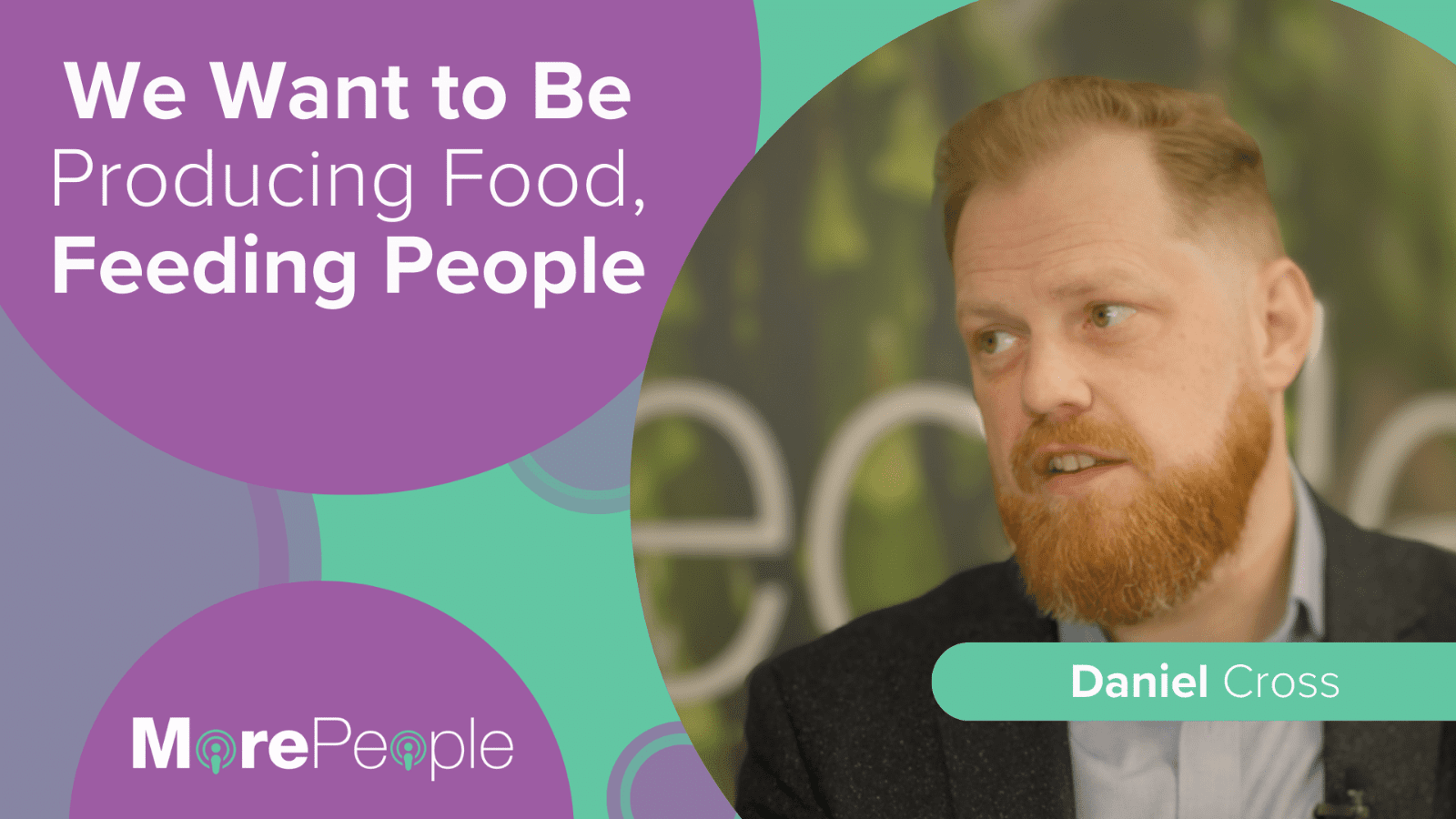
Episode Three: The MorePeople Podcast with Daniel Cross
Inside Circular Farming: Dyson Farming's Vision for a Sustainable Future
Welcome to The MorePeople Podcast, where we dive deep into the world of careers, recruitment, and the ever-evolving industries that shape our economy. In this episode, host Andrew Fitzmaurice, CEO at MorePeople, sits down with Daniel Cross, Managing Director of Dyson Farming, to explore one of the most forward-thinking conversations in modern agriculture: circular farming.
Meeting the Mind Behind Dyson Farming
With over 25 years in food and farming, Dan Cross brings a wealth of experience from the UK, Europe, and the US, including a long tenure at the G’s Group. Now leading Dyson Farming, Dan is steering the business through bold innovation and sustainable strategy.
At the heart of the conversation is the concept of circular farming, an approach focused on closing the loop in agricultural production by turning waste into valuable inputs.
What Is Circular Farming?
While not a universally understood term yet, circular farming is taking root as a critical shift in how we think about food production. As Dan explains, the core idea is simple: turn byproducts of farming into new inputs, like fuel, heat, and fertiliser, to create a more self-sustaining system.
At Dyson Farming, this is more than theory. It’s practice.
They’ve developed a model in which their energy-intensive strawberry production is powered almost entirely off-grid. Their Anaerobic Digestion (AD) plants generate electricity, heat, and even CO₂ - vital inputs for growing high-quality crops in controlled environments.
Farming Fuel: How AD Plants Play Their Part
Dan describes a carefully planned system. Two AD plants power the operation, one that uses farm-grown feedstocks like maize, hybrid barley, and rye, and another licensed to process waste. Importantly, Dyson Farming only uses inputs grown on its own land. This feeds back into a cycle where the digestate from the AD plants returns to the soil as fertiliser, enhancing long-term soil health.
And no, you can’t just throw anything into an AD plant and expect it to work. “There is a recipe,” Dan says. Like a biological engine, each plant is unique, depending on its microbial history, and must be fine-tuned for optimal biogas and nutrient output.
Balancing Priorities: Food, Fuel, and the Future
While AD plants are impressive, Dan is quick to stress Dyson Farming is first and foremost a food producer, not an energy business.
Their focus remains on feeding people with food, not fuel. The AD system is complementary. It fits within crop rotations, supports soil health, and allows for innovation without compromising their primary mission: sustainable, nutritious, UK-grown food.
A Holistic Farming Enterprise
Dyson Farming is more than strawberries and maize. From cereals and root vegetables to livestock and wildflowers, the business spans a wide array of enterprises. With farms across Lincolnshire, Oxfordshire, and the South West, it’s a national operation.
Biodiversity and working with nature are fundamental to their approach. “It’s not just about yields, it’s about productivity over time,” Dan emphasises. Pollinators, woodland management, and natural cycles all play a role in Dyson Farming’s long-term vision.
Farming Is a Business: a Vital One
One of Dan’s most passionate points comes toward the end of the episode: the role of farming in society is misunderstood. While farmers are often seen merely as custodians of the countryside, the reality is they’re entrepreneurs, employers, producers, and problem solvers.
And with rising health costs and a strained NHS, Dan sees UK agriculture as part of the solution. “We should be growing more fruit and vegetables here, improving diets and reducing the healthcare burden,” he argues. “Food and farming need to be seen as national priorities.”
Local Food Culture: The Missed Opportunity
Dan laments the UK’s drift toward a fast-food, convenience-heavy culture, with little connection to seasonality or origin. He contrasts this with European models, where provenance and local pride are key parts of everyday eating.
“Our food culture matters,” Dan says. “Consumers buy from supermarkets but often have no idea if it came from Cornwall or Ethiopia.” And that’s where he sees opportunity, not just in better branding, but in building meaningful connections between producers and consumers.
Dyson Farming is exploring ways to bring their story to the forefront using clear branding, transparent narratives, and a focus on values to connect with both kids and adults. Education, they believe, will be key.
Final Thoughts: What Would Dan Tell His 24-Year-Old Self?
“Be bolder. Prioritise better. Be more confident,” Dan reflects.
He encourages young professionals to take time to think strategically, not just chase the treadmill of hard work. The future is about smart decisions, not just fast ones.
Wrapping Up
This conversation with Dan Cross offers more than a glimpse into a single company. It’s a call to rethink how we grow, eat, and value food in the UK.
If you’re in food, farming, or just interested in the future of sustainability and health, this episode is one to bookmark.
